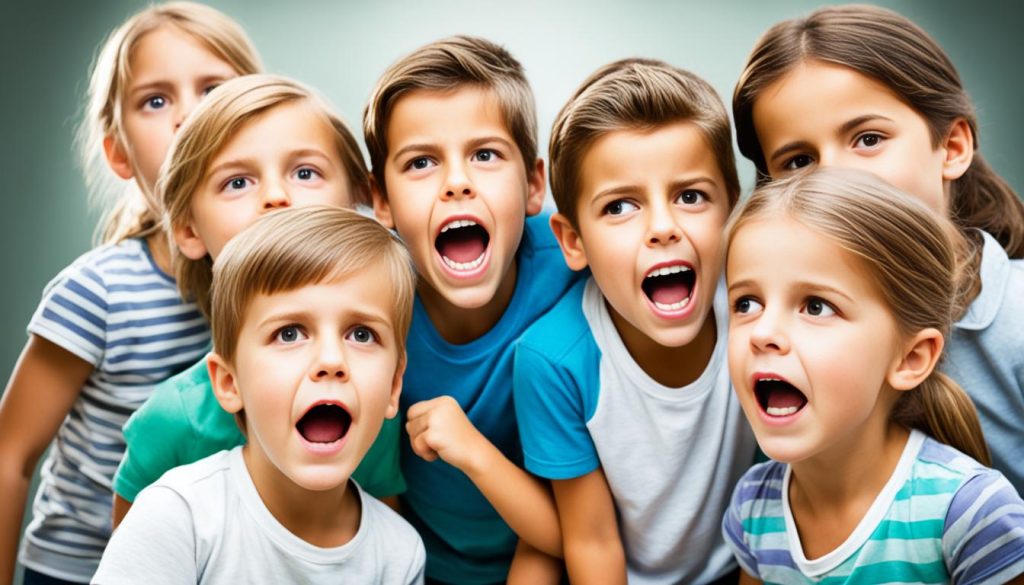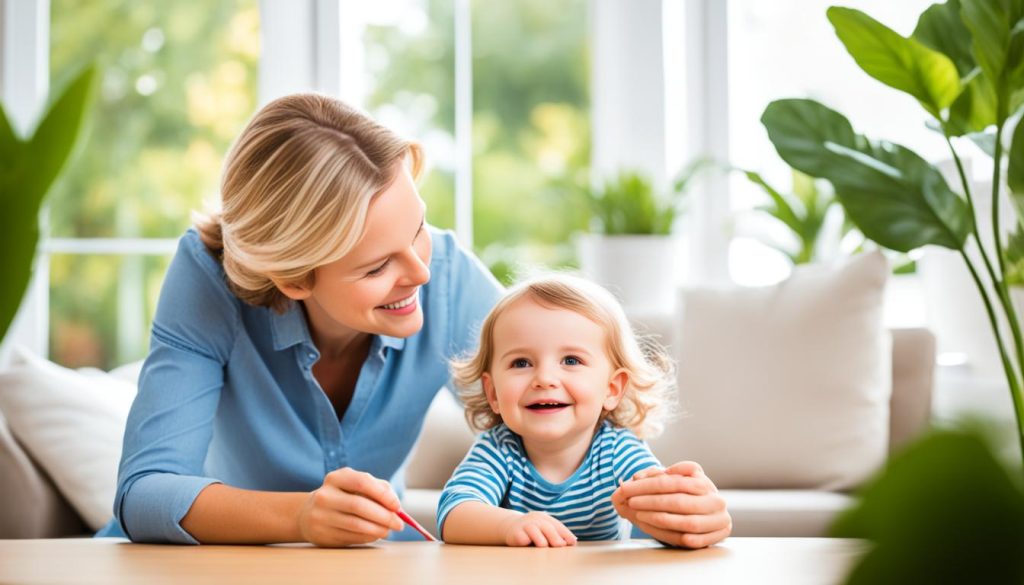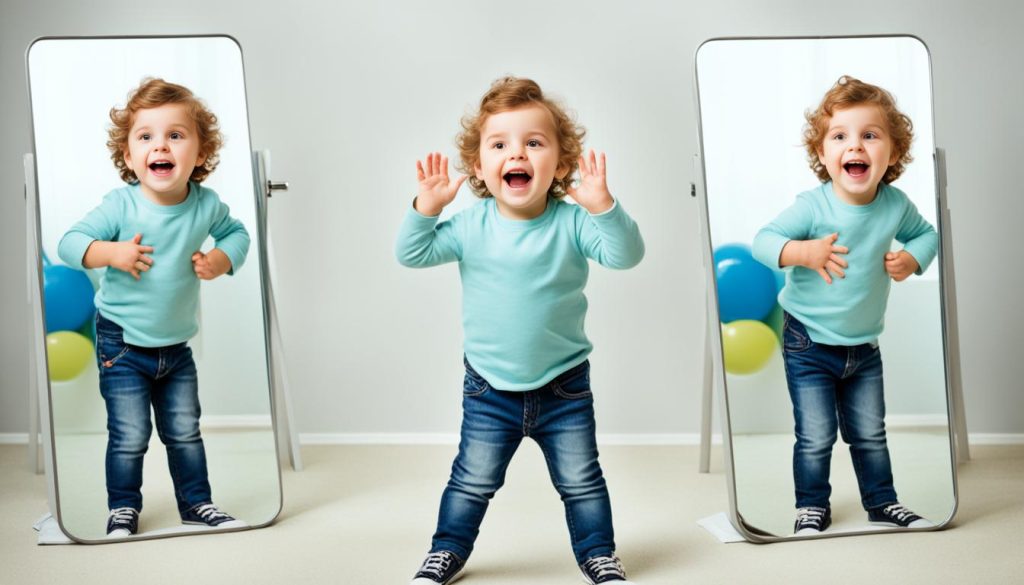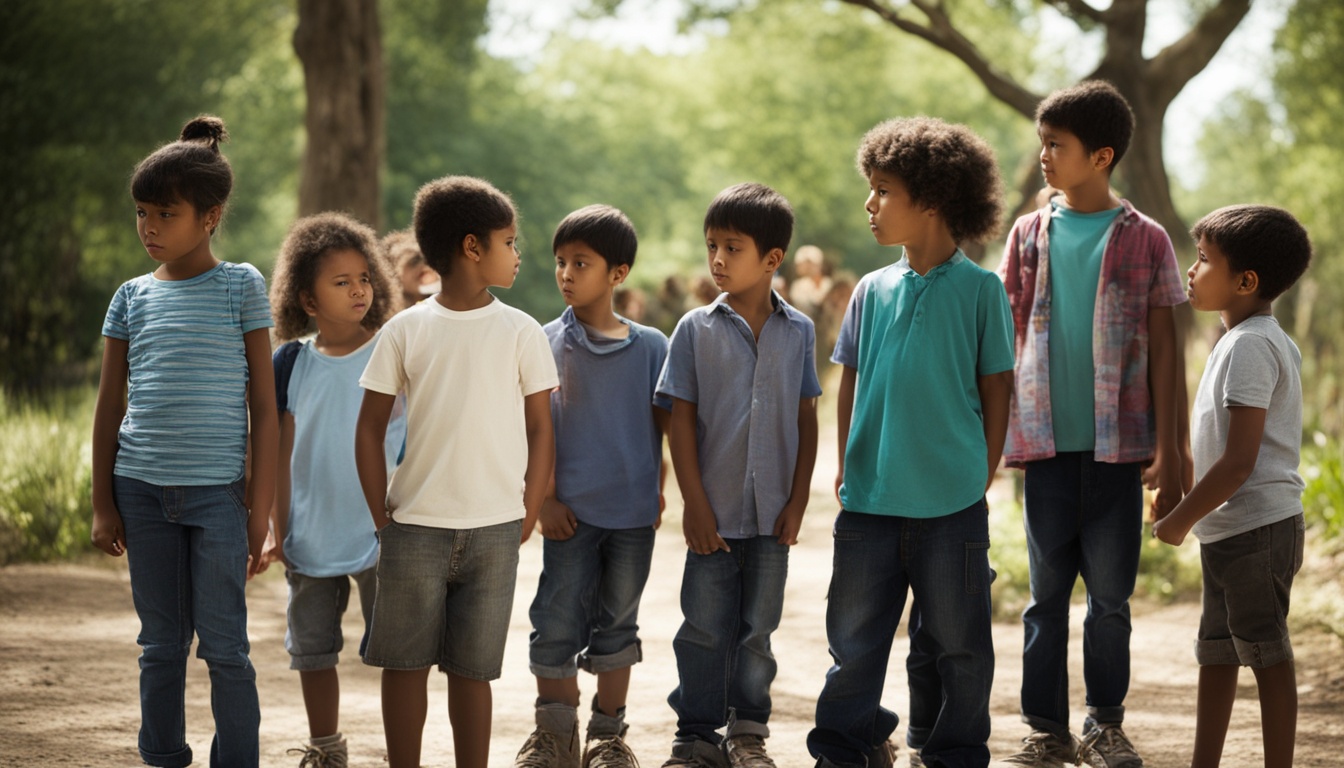Imagine your child comes home from school, looking sad, and avoiding eye contact. They say “okay” when you ask about their day and quickly go to their room. This change in behavior hints at the power of peer pressure, a force that shapes kids and teens in their social lives.
As parents, you’re the steady support in your child’s world of feelings and social interactions. Peer pressure can push kids to wear certain clothes, listen to certain music, or take risks. Kids with low self-esteem are more likely to follow bad peer examples. But, kids who feel supported at home can stand up to it better.
Peer pressure can either lift your child up or pull them down. It can make them feel anxious or depressed. Supporting your child’s mental health means understanding these pressures and talking openly with them. By noticing changes in mood or behavior, you can help them through tough times. Teaching them to understand their feelings and build their self-esteem is key to helping them deal with peer pressure.
Key Takeaways
- Children with low self-concept are more susceptible to peer influence and a desire to conform.
- Boys are more likely to experience pressure for risk-taking behaviors, while girls often face pressure about appearance.
- Encouraging open communication helps children seek support when feeling pressured.
- Providing ways to say no and escape strategies can enhance your child’s resistance to negative influences.
- Building self-confidence in children helps them better manage and resist peer pressure.
What is Peer Pressure?
Peer pressure happens when people feel forced to act like others in their group. It’s important to teach kids about responsibility and independence to help them deal with this. Peer pressure can push people towards good things like doing well in school or helping others. Or it can lead them to do bad things like spreading rumors or being mean.

Different Forms of Peer Pressure
Peer pressure can show up in many ways:
- Direct Pressure: This is when someone directly tells you to do something, like drink or smoke.
- Indirect Pressure: This is when you see others doing something and you start doing it too, even if you don’t want to.
- Positive Pressure: This is when friends push you to do well in school or help out in the community.
- Negative Pressure: This is when friends try to get you to do things that go against what you believe in, like skipping school or using drugs.
Positive vs. Negative Peer Pressure
Positive peer pressure can make kids want to be kind and help others, even when no one is watching. They might feel like they should do good things, like helping others or being kind. But, negative peer pressure can make kids do things they shouldn’t, like skipping school or using drugs, which can hurt them.
| Types | Examples | Impacts |
|---|---|---|
| Positive Peer Pressure | Encouraging academic pursuits, community service | Boosts prosocial behavior, reinforces positive values |
| Negative Peer Pressure | Pressuring to skip school, substance misuse | Endangers safety, undermines personal values |
Parents have a big role in fighting negative peer pressure. They can teach kids to be responsible and creative.
Signs Your Child May Be Experiencing Peer Pressure
It can be hard to tell if your child is under peer pressure. Look for changes in their usual behavior or routine. Kids aged 11-14 might start caring more about their looks or change their sleep habits to fit in.

Kids this age are easily swayed by their friends as they figure out who they are. They might take risks like trying alcohol or drugs, which can hurt their grades and brain growth. Look out for dropping grades, pulling away from friends, and mood swings as signs of peer pressure.
Parents might see their child skipping school or feeling uneasy in social situations. This could mean they’re dealing with bullying or mental health issues. Seeing more detentions or suspensions at school could also point to stress or problems with teachers.
If your child starts acting reckless or changes their eating and sleeping habits, it might be peer pressure. As a parent, it’s important to help them be independent and set clear rules to guide them through tough times.
During this time, it’s key to use discipline wisely. It helps deal with bad behavior and teaches responsibility and decision-making. Setting clear rules can help your child stand up to bad influences and make better choices.
| Age Group | Common Indicators |
|---|---|
| 11-14 | Declining grades, increased social withdrawal, heightened mood swings, avoidance of school, engagement in risky behaviors such as alcohol and drug use. |
| Signs of Peer Pressure | Changes in sleep and eating habits, personality changes, socially withdrawn behavior. |
By spotting these signs and dealing with them, you can make a supportive space for your child to grow. Using the right discipline and setting clear rules helps them handle peer pressure better.
The Role of Peer Pressure in Emotional and Social Development
Peer pressure is key in shaping a child’s emotional and social growth. It’s important to understand its effects on your child for their development. While often seen as negative, it can also be positive, helping with social skills and emotional strength.

Positive Influences on Social Skills
Positive peer pressure boosts your child’s social skills. It encourages them to try new hobbies, make healthy friends, and get used to different social situations. These experiences help them learn how to fit in and keep good friends, which is crucial for growing up.
- Enriching friendships: Healthy friends offer emotional support and help kids try new things.
- Adapting to social settings: Being with others teaches kids important social rules and behaviors.
- Growth-minded behavior: Positive parenting helps kids make good choices in social situations.
Negative Effects on Emotional Well-being
But, peer pressure can also hurt a child’s feelings. It can make teens act in ways they shouldn’t, like using drugs. Most teens start these behaviors to fit in and be popular. This can lead to feeling anxious, sad, and fighting with family, making it hard to focus on school and feel stable.
- Anxiety and Depression: Feeling too much stress and emotional pressure can make these feelings worse.
- Conflicts with Family: Peer pressure can make kids and parents disagree, making it hard to talk and understand each other.
- Decline in Academic Performance: Paying too much attention to peer pressure can make kids do poorly in school.
Positive parenting, teaching kids to be grateful, and helping them feel confident can lessen these bad effects. Also, knowing when your child is under peer pressure and getting help from teachers or counselors is key to supporting them.
| Positive Influences | Negative Effects |
|---|---|
| Adapting to various social settings and developing friendships | Increased anxiety and depression |
| Enrichment of social skills through healthy peer interactions | Substance abuse and risky behaviors due to need for acceptance |
| Exposure to growth-minded behaviors and social norms | Conflicts with family and decline in academic performance |
Understanding both the good and bad sides of peer pressure helps you guide your child through this tough part of growing up. Encouraging them to talk openly and building their resilience is key to handling peer pressure well.
How Peer Pressure Affects Self-Esteem and Self-Concept
Peer pressure deeply affects a child’s self-esteem and self-concept. It can greatly impact their well-being. When kids have positive friends, they feel more confident and valued. This makes them feel like they belong and are understood.

But, negative peer pressure can have the opposite effect. Kids might feel forced to change how they look or act to fit in. This can hurt their self-image. It shows how important it is to find a balance between fitting in and staying true to oneself.
Research shows that a supportive family helps kids feel good about themselves. Things like a loving home, watching over them, and having a father around make a big difference. But, a tough home life and money worries can hurt their self-esteem.
Encouraging kids to be creative is key to fighting off bad peer pressure. Letting them express themselves through art or writing can make them stronger. Being creative helps kids know who they are and stand up to others.
The study found teaching kids how to communicate clearly and say “no” is important. These skills help them stick to what they believe, even when others pressure them (Ashton, 2016).
A supportive home where kids get more praise than criticism is crucial. Research says giving out four times more praise than criticism can really help a child’s confidence. This kind of home helps kids be creative and keep a strong self-esteem, even when faced with peer pressure.
| Influence Factors | Positive Impact | Negative Impact |
|---|---|---|
| Parental Warmth | Increases self-esteem | — |
| Economic Security | Boosts family stability and child self-worth | — |
| Parental Hostility | — | Decreases self-esteem |
| Presence of a Father | Enhances self-concept | — |
Strategies to Help Your Child Handle Peer Pressure
Teaching your child how to deal with peer pressure is key to their growth. It’s important to build their self-confidence and assertiveness. This helps them stand up for themselves and stick to what they believe in.
Building Self-Confidence and Assertiveness
Helping your child feel confident is key. Confident kids are more likely to stick to their own choices. Encourage them to try new things like sports, arts, or clubs. This can really boost their self-esteem.
Positive parenting also helps a lot. It makes them more confident and good at talking to others. This way, they’re less likely to follow bad advice from friends.
Encouraging Open and Honest Communication
It’s important to create a safe space where your child feels they can talk about peer pressure. Ask them about their experiences and feelings. This helps you understand what they’re going through and how you can help.
Talking about managing screen time and social situations is also key. It helps them think critically and make good choices. These talks can also help keep them safe online by talking about the dangers of social media and bad influences.
Developing a Network of Support
Building a circle of support is a great idea. Family, teachers, mentors, and friends who share your values can offer advice and support. Encourage your child to hang out with friends who are positive influences. They’re less likely to give in to bad peer pressure.
This network can also help with managing screen time and keeping children safe online. It reinforces the values you teach at home.
By using these strategies, you’re preparing your child for tough situations. They’ll be able to make good choices and stay true to themselves. This approach not only deals with peer pressure but also builds a confident and resilient kid.
The Importance of Positive Parenting in Managing Peer Pressure
Using a positive parenting style is key to helping kids deal with peer pressure. When parents work on Strengthening Parent-Child Bond, kids feel safe and understood. This helps kids handle peer pressure better.
In today’s digital world, keeping an open line of communication is vital. A strong bond between parents and kids lets kids share their feelings without fear. This trust helps parents guide their kids through tough social situations.
Positive parenting also means Teaching Diversity to Children. Teaching kids to value diversity helps them think for themselves and face social challenges with strength. This approach lessens the bad effects of peer pressure. Letting kids lead in playtime can also make the parent-child bond stronger and boost kids’ confidence.
Children start to manage their feelings and actions around age three. Letting them handle tough situations with your guidance helps them develop good coping skills. Families learning emotional coaching see a big jump in kids’ positive behaviors and happiness. Parents should let kids solve problems on their own to help them become more independent and resilient.
It’s never too late to work on a better relationship with your child. Starting positive parenting early or later can bring many benefits to your child’s growth. Using parenting resources and these methods can make kids better at handling peer pressure.
Parenting and Raising Kids: Setting Boundaries and Guidelines
Setting clear rules is key in parenting and raising kids, especially when dealing with peer pressure. Using effective discipline strategies helps guide your children to make good choices. Setting fair limits gives kids a sense of safety and lets them find who they are. It’s important to see and support each child’s unique needs. This is crucial for parenting well.
Setting boundaries helps kids know what’s right and wrong. Parents who set these boundaries teach their kids to control their actions and focus on what’s important. This is very useful for how they’ll act later on. It’s also key to teach social skills as they happen, helping them remember good behavior for the future.
Studies show that kids do better in life if they have clear rules at home, given with love. This kind of home helps kids grow into respectful, empathetic, and responsible people. For example, by three years old, kids often show they care about others and notice when someone is upset.
Letting kids make their own choices about showing love is important. It helps them be more independent and have better relationships. It also helps them stand up for themselves against bad habits and negative peers.
Parents need to find a good balance between work and family life for their kids. Letting kids explore their interests within rules helps them be creative. Studies show that parenting with clear rules leads to better behavior and relationships in kids. So, teaching kids to be independent but still having rules is good for them.
Being consistent with rules is very important. A study in the Child Development Journal found that kids with consistent rules behave better than those with changing rules. It’s also key to teach kids about the effects of their actions. A survey by Parenting Today showed that 78% of parents think consequences are important for kids’ behavior. Being fair and consistent with consequences teaches kids to be responsible.
Positive rewards and praise also work well. Research from Parenting Insights Quarterly showed that kids like being praised for good behavior. This helps them want to act responsibly. Knowing this helps parents support their child’s growth and prepare them for dealing with friends.
Monitoring Your Child’s Social Interactions and Online Presence
Keeping an eye on your child’s social life and online activities is key in today’s digital world. It helps you understand their friends and the pressures they face online and offline. It also protects them from the bad influence of social media and online chats.
Teenagers start to feel the effects of social media early, around age 10. Their brains are more open to peer pressure during this time. It’s important to keep them safe online. Their brains don’t fully control themselves until they’re much older, so setting clear rules for social media is crucial.
Managing social media well means setting time limits, watching over their online activities, and talking about it. Talking often with your child helps keep their brain and feelings safe. For tips on talking about tough topics, check out this guide here.
Studies show that teens learn how to use social media from their parents. So, it’s key to show them good social media habits. Watch and talk about their online use, limit their exposure to adult content, and set rules for chatting with strangers. Teaching them about social media can make their online time better and safer.
It’s also vital to keep an eye on how much time they spend on screens. Too much social media can hurt their sleep, daily activities, and exercise. Look out for signs like always wanting to check social media, preferring it over real-life talks, and it affecting their daily life. Tools and apps for managing screen time can help keep a good balance.
Don’t forget about “sharenting,” sharing your child’s photos and info online. It can be a big privacy issue and affect them later on. Creating a family media plan and doing things offline together can help keep a healthy mix of online and offline life. This is good for everyone’s well-being.
In the end, watching your child’s online life, talking with them, and setting rules can really help. It teaches them good manners and shapes their digital world in a positive way.
Conclusion
Understanding how peer pressure affects your child is key to their growth. From school days to being a teen, friends play a big role in their feelings and social skills. It’s important for parents to spot and deal with peer pressure early.
Teaching kids to keep learning starts with good parenting. Making sure kids get enough sleep and teaching them healthy habits helps them stand up to bad peer pressure. When both dads and moms are involved, kids feel more supported and confident.
Creating family traditions helps fight peer pressure too. These traditions make kids feel they belong and are safe. Parents teaching values like morals and ethics is crucial for a child’s strong character. Also, being a caring but strict parent helps kids manage their feelings better and lowers the chance of feeling sad.
In the end, fighting peer pressure means watching over your child, talking openly with them, and creating a caring home. By doing these things, parents help their kids make good choices. This leads to their success and happiness throughout life.
FAQ
What are the typical signs that my child is experiencing peer pressure?
How can positive peer pressure benefit my child’s social skills?
What are the differences between positive and negative peer pressure?
How does peer pressure impact my child’s self-esteem and self-concept?
What are effective strategies to help my child manage peer pressure?
Why is positive parenting important in dealing with peer pressure?
How can setting boundaries and guidelines help my child with peer pressure?
How can I monitor my child’s social interactions and online presence regarding peer pressure?
What role does peer pressure play in my child’s emotional and social development?
How can I encourage open communication with my child about peer pressure?
This post contains affiliate links. If you click on a link and make a purchase, I may earn a small commission — at no extra cost to you. Thank you for supporting this blog and helping me keep the patterns free! Read the full Affiliate Disclosure & Transparency.
